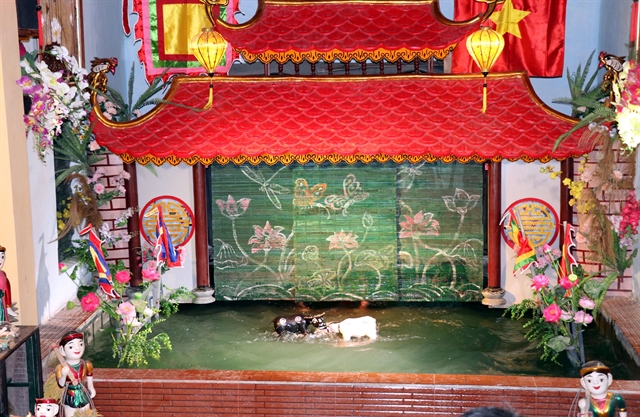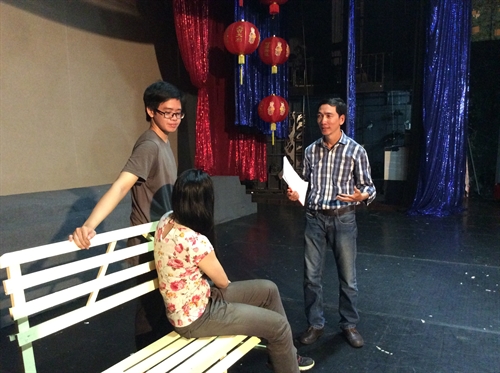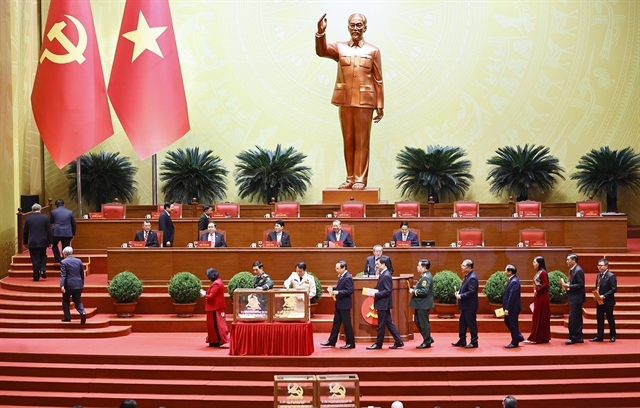 Features
Features

In the late 1980s, when Lê Quang Trực taught literature at a secondary school in HCM City’s rural Hóc Môn District, he was searching for ways to keep his students interested – and awake.
 |
| Acting out: Lê Quang Trực, lecturer in literature at HCM City Open University, helps his students act in a play based on the English-language novel Atonement, staged at the HCM City Drama Theatre in District 1. Photo courtesy of Lê Quang Trực |
Gia Lộc
HCM CITY — In the late 1980s, when Lê Quang Trực taught literature at a secondary school in HCM City’s rural Hóc Môn District, he was searching for ways to keep his students interested – and awake.
He started by using the famous work by Dế Mèn Phiêu Lưu Ký (Diary of a Cricket) by author Tô Hoài. What if the students play-acted the roles of the characters in the tale that every Vietnamese child knew?
It turned out to be a winning approach: The students remained alert, happy and attentive.
Today, Trực, who works as a foreign literature lecturer at HCM City Open University, still incorporates innovative methodology in his classroom.
At the university level, however, he is slightly more demanding. Students are asked to act in full-length plays based on literary works of their choice.
At first, the plays were performed informally in the classroom, but they have since moved to the big stage at the HCM City Drama Theatre in District 1.
It was when Trực’s students performed Shakespeare’s Romeo and Juliet in the classroom about six years ago that he decided to expand the concept.
“Their performance touched my heart, but it was even more wonderful when they staged the play at the Drama Theatre,” Trực said.
In 2012, Trực submitted a proposal to the Open University’s rector to stage English-language plays at the school, but it was rejected.
He then sought out the director of the Drama Theatre, Trần Khánh Hoàng, who provided guidance on acting and costume design.
Language skills
The “theatre in education” concept not only develops creativity but language skills as well, according to Trực.
“Theatre in education and literature has been used in developed countries for many years. We in Việt Nam can do this also, if we want. The country’s students can learn and practise in this environment, just like in developed countries,” Trực said.
Besides acting in English, the activity improves team-building and often helps to uncover the hidden talent of students.
“I also want my students to have an unforgettable university experience,” Trực said.
Open University’s new rector, Nguyễn Văn Phúc, has provided funds and other assistance to carry out Trực’s theatre initiative every year.
On June 4 and 5, students enrolled in the university’s foreign language faculty, along with students from other universities in the city, performed in plays based on the English-language novels Atonement and Vanity Fair as well as the fairytale The Nightingale and the Rose at the Drama Theatre. The performances were a rousing success.
Trực wants other universities to use his method in the classroom. He is now working with former student Phạm Bá Văn Quân, a lecturer at Nguyễn Tất Thành University’s Faculty of Foreign Languages, to help more students access the methodology.
Trần Thúc Tài, lecturer at the Open University’s Civil and Electrical Engineering Faculty, who attended the recent performances at the Drama Theatre, said that Trực’s methodology was modern and creative.
“Literature is no longer difficult to learn, and it has become more absorbing for the students,” Tài said.
The new approach has also forced teachers to adapt to a new role.
“In the past, teachers were seen as ‘boat people’, but now they are guides who must become ‘good captains’,” Trực said. VNS




